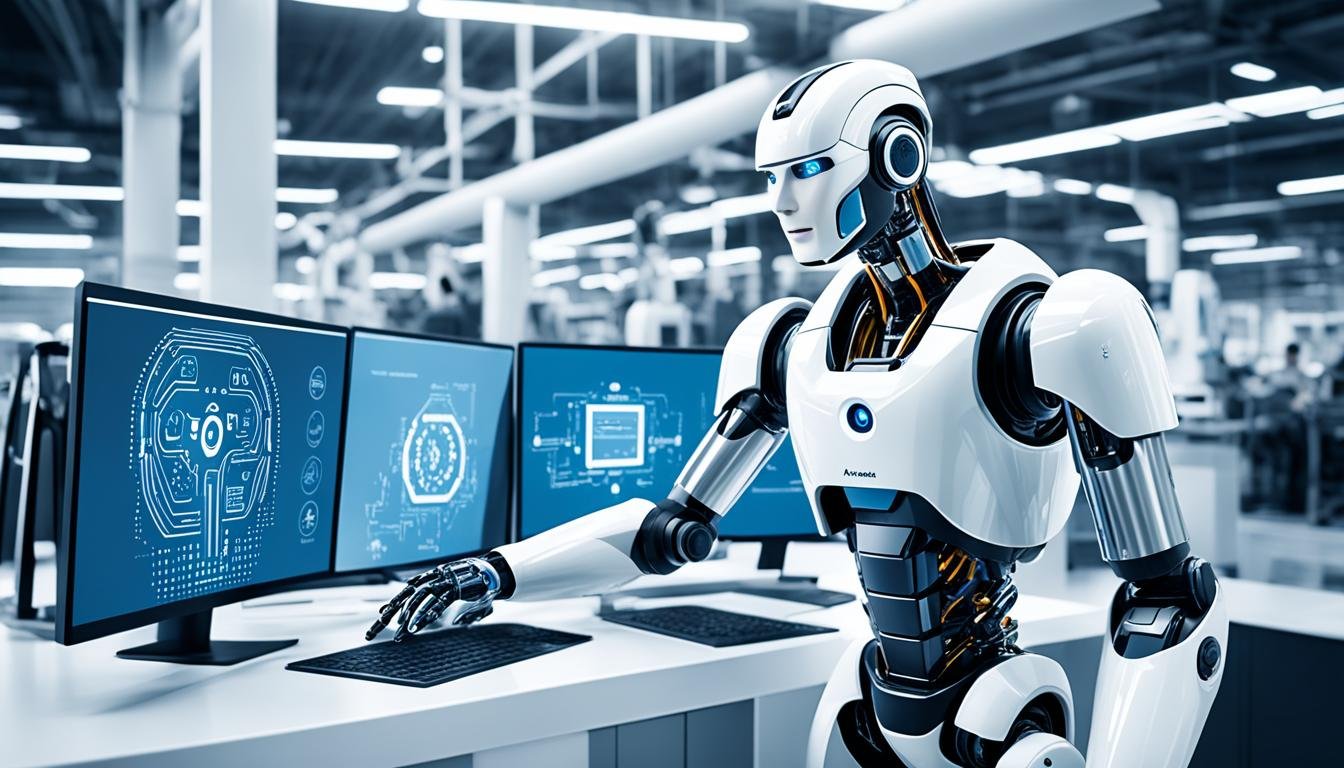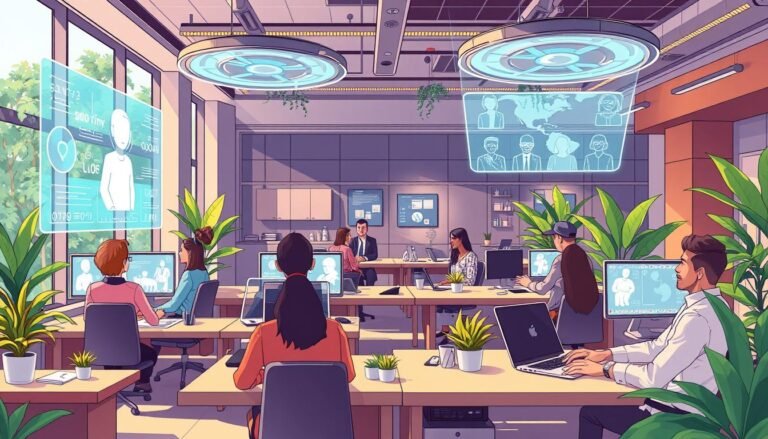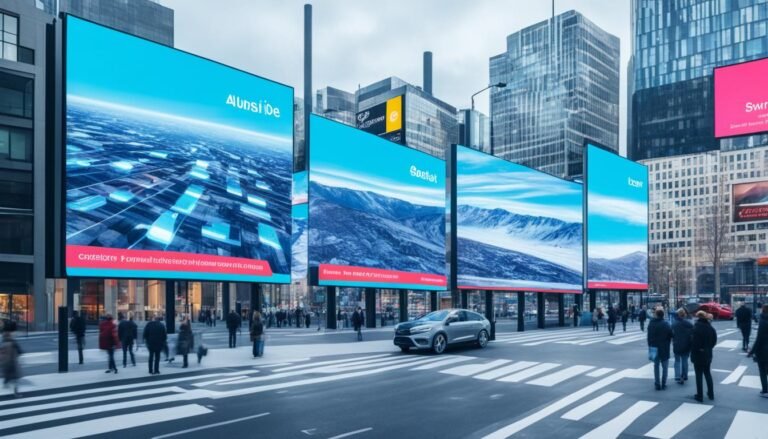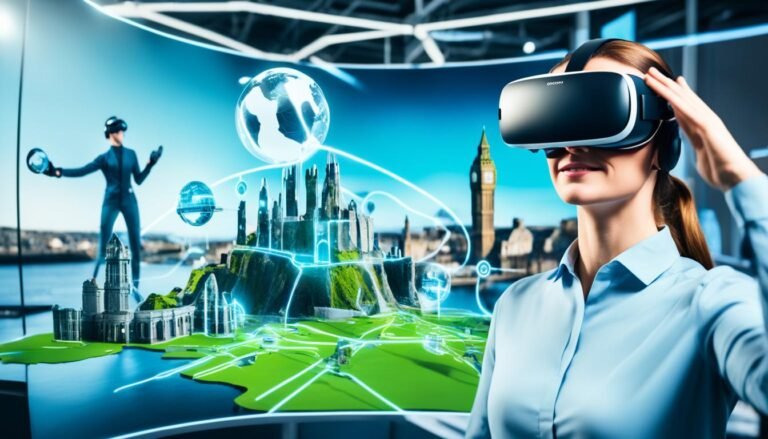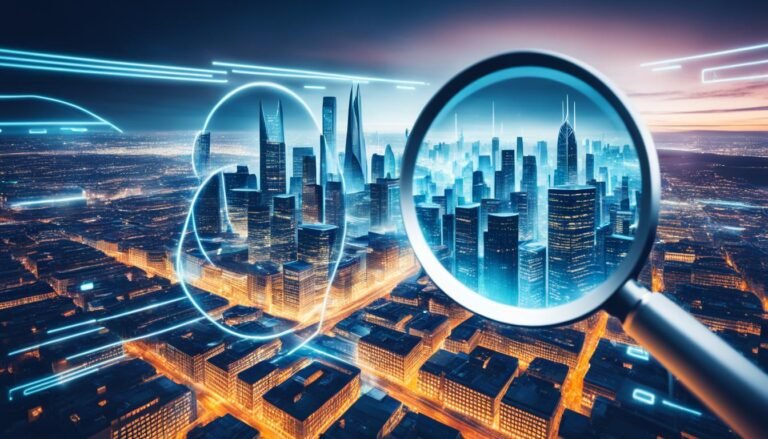The Future of AI: How Artificial Intelligence is Transforming Industries
Imagine a world where artificial intelligence is everywhere, changing how we live and work. A recent IBM survey shows that 42 percent of large businesses already use AI. Another 40 percent are thinking about starting to use it.
AI innovation is making big waves in healthcare, finance, retail, and manufacturing. Technologies like OpenAI’s GPT are getting better quickly. They show us how powerful AI can be and what it means for the future.
Key Takeaways
- 42 percent of large businesses now use artificial intelligence.
- 38 percent work with generative AI, while 42 percent plan to start soon.
- About 55 percent of organizations are using AI to some degree. This hints at more automation in the future.
- Many employees think nearly a third of their work could be done by AI.
- By 2028, 44 percent of workers might see changes to their jobs because of AI.
The Evolution of Artificial Intelligence
The growth of artificial intelligence is truly amazing. It has turned movie ideas into real-world solutions. Along the way, we’ve seen huge steps and important events that have guided our use and understanding of AI today.
Early Developments and Milestones
In 1951, Christopher Strachey created the first step in AI – a checkers program. Since then, we’ve seen big moments, like IBM’s Deep Blue beating chess champ Garry Kasparov in 1997. Then, in 2011, IBM Watson won Jeopardy!. These wins showed AI could think and solve problems in smart ways.
Emergence of Machine Learning and Deep Learning
Machine learning and deep learning have changed the game for AI. They let AI learn from data and solve problems without constant programming. Machine learning spots patterns and decides, while deep learning uses networks for in-depth understandings of big data. These steps forward are key in AI’s advancements across fields.
Current Advancements in Generative AI
Today, we’re seeing a new chapter in AI with generative AI. OpenAI’s GPT-4 and models like ChatGPT can now create content that makes sense. This change is huge, with over a third of businesses using generative AI now. It’s improving AI’s skills in seeing, thinking, and understanding a lot.
Already, many big companies are using AI, showing how fast AI is becoming normal. As generative AI advances, it shines new light on how tech and culture meet. It’s all shaping the future of AI, not just in tech but in how we live and think about AI.
Impact of AI on Business Automation
AI is changing the game for businesses, with over 55% now using it in their operations. Tools like chatbots and digital assistants are key. They make customer service better and handle repetitive tasks automatically.
Machine learning (ML) is at the forefront of AI, designed to process large amounts of data quickly. Deep learning, a subset of ML, uses neural networks for more complex reasoning. It constantly improves with more data. This helps in making smarter decisions based on huge data sets. It’s changing the way finance, healthcare, and marketing work.
The insurance field is using ML to make underwriting easier and spot fraud faster. It’s part of a big shift where ML helps understand areas like energy usage and maintenance needs better.
AI also boosts cybersecurity to better spot and stop cyberattacks. It shows how important it is for companies to have strong digital defenses.
AI is making customer relations better too. It turns CRM systems into smarter tools that can update and correct themselves. They handle customer interactions more efficiently. Plus, AI is great for finding online search patterns and sharing relevant information.
Chatbots and digital assistants are leading the way in business automation. They manage emails, calendars, and deal with customer questions easily. This tech allows leaders to act quickly with solid information. It really ramps up productivity and efficiency.
Job Disruption and AI
Advanced AI is creating new chances and big challenges for worldwide jobs. This tech is quickly changing how businesses work, affecting which jobs are safe and which are not.
Risk of Job Losses
The impact of AI on our economy is huge. By 2030, it could boost the global economy by up to $13 trillion. But, this also means that many jobs we know now might change or even disappear.
Studies say AI could replace around 300 million jobs in the US and Europe by 2030. By 2025, it might take over two million manufacturing jobs. Jobs that pay up to $80,000 a year could also be affected the most.
Upskilling and Workforce Transformation
Even though job loss is a big worry, there’s a chance to learn new skills and transform the workforce. Roles like machine learning experts and security analysts are now in high demand. This shows the need for more education to match new technology needs.
It’s really crucial that companies invest in training their staff. This helps keep them ahead in AI and better prepares them for new jobs. Focusing on training is a key move for companies looking to stay ahead in the changing job market.
While AI may cause jobs to change, being ready for these changes is smart. By preparing now, both workers and companies can find success in the new AI-focused world.
Data Privacy Issues in AI
Artificial Intelligence (AI) tech has grown big with new algorithms and more computer power, letting it fit into our lives better. But, this quick progress brings up big worries about data privacy. AI needs a lot of data to learn, which includes consumer data. This data is always being collected, looked into, and sometimes, it’s misused.
The FTC is worried and looking into OpenAI’s way of collecting data. This shows more and more people are checking AI for fairness. Finding ways to keep our data safe is really important. If not, it can harm our privacy a lot and ruin what people think of a company.
Many countries have made strict rules around data privacy, like the GDPR in Europe. These laws make sure personal data is handled carefully, with big penalties for breaking them. But, there’s still a need for bigger, more clear rules. Something like the AI Bill of Rights. This bill wants to make sure AI’s use is fair and it can be checked if needed.
AI should be able to explain why it makes certain decisions. This helps build trust. But, building this trust needs not only smarter AI but also good management and rules. All this work is to make sure AI is used in a way that’s fair and good for everyone.
“Every breach is a stark reminder that we must prioritize data security and ethical guidelines to protect personal information.” – FTC Representative
AI in Manufacturing
AI in manufacturing is moving fast. The market is expected to hit $16.3 billion by 2027. This shows a big growth rate of 47.9% each year. Since the 1980s, robots have changed how things are made. They make production lines more effective and less prone to errors.
For every robot brought in, 1.6 jobs might go away. This change could replace 20 million jobs worldwide with AI and robots by 2030. But, new jobs will be created to manage these technologies.
One big use of AI in manufacturing is predictive analysis. This method looks for issues in equipment before they become big problems. It makes machines work better and last longer. General Electric uses this to improve their maintenance and work efficiency.
Companies like Siemens and Samsung use AI to make better products. Siemens’ Smart Manufacturing uses IoT, AI, and robots to increase productivity. Samsung uses AI to check the quality of its products, keeping its good name.
Manufacturing is changing to smaller, local bases. AI is key in making this work well without traditional outsourcing. Technologies like 3D printing are part of this, with big promise for many fields.
Strong AI can predict what people will need, keep stock in check, and spot problems in the supply chain early. With AI, manufacturing gets better at running smoothly and being creative. This makes AI vital for the future of industry.
The Future of AI: How Artificial Intelligence is Transforming Industries
Artificial intelligence is significantly changing many industries. It is making tasks easier and decisions smarter. The effect of AI spreads wide, touching every corner of business.
Transformations in Different Sectors
In healthcare, AI is making big waves. It’s giving us tools to check up on our health, both physical and mental. With AI, we can diagnose and treat illnesses better. AI virtual doctors, like those from Babylon Health, let us talk to a doctor any time. This makes healthcare more available and efficient.
In finance, AI is key for spotting fraud. It checks for any unusual activity, helping to keep our money safe. In education, AI means learning just for you. It makes lessons fit what each student needs to learn best.
The media and customer service worlds are also getting a makeover. In retail, AI picks out things you might like to buy, making shopping more fun. Chatbots in customer service make help available 24/7. They understand us better and cut down on waiting times.
The auto industry is breaking ground with self-driving cars. By 2040, we could see 33 million of these cars on the road. It shows how AI is changing many different areas.
Challenges and Ethical Considerations
Though AI brings many benefits, there are big challenges too. One major issue is ethics. Figuring out how to grow AI while keeping our data safe is key. The work on creating and running AI can harm our planet too. It might make our carbon emissions jump by 80 percent.
From 2023 to 2028, many jobs might change because of AI. About 44 percent of people’s skills might need a new focus because of AI. This shift could hit women harder, widening the gap between men and women in AI skills.
Solving ethical challenges needs clear rules and action. We should make sure everyone can learn about AI fairly. And we need to protect those who could be left behind by AI changes. A fair, careful plan will help us use AI’s good parts while keeping our values strong.
AI’s Role in Climate Change and Sustainability
Artificial Intelligence (AI) has a big role in fighting climate change and making the planet greener. It can help with 134 out of 169 goals set by the United Nations. This includes making life better for people in many ways.
On the other hand, AI might not be perfect for all goals. It could cause problems for 59 of these goals. When it comes to society goals, AI shines in helping with 82% of them.
Take smart, low-carbon cities for example. They brighten up our lives with clean water and cheap energy, thanks to AI. But, making and using AI this way needs more electricity. By 2030, tech could use up 20% of all electricity, making our carbon footprint bigger.
Our current info tech use only makes up 1% of energy needs worldwide. But, powerful AI models like ChatGPT use up to 10 times more power. This means we need to be super careful. We must balance tech growth with caring for the planet.
AI is making the way we handle supply chains a lot smarter. By fixing things before they break and predicting future needs, we waste less and use less. For example, using AI, governments can catch water polluters much better. This helps in taking care of the environment.
Also, many companies are turning to clean energy to power their AI. They aim to use only renewable power, which won’t harm the planet. This is quite tough, but a big goal. AI has also made the tech world focus more on eco-friendly ways to do business.
But, there are big worries about how AI learns from data. It might copy unfair practices from the past. Or, it might not be clear why AI makes the decisions it does. So, creating rules for AI must be done carefully, thinking of everyone’s needs and values.
In the end, AI offers big chances to save our planet and help people. But, we can’t ignore the risks it brings. Making sure AI helps and doesn’t harm is key. Balancing new ideas with protecting our home is very important.
AI in Healthcare
Artificial intelligence is changing healthcare for the better. It’s making diagnoses more accurate and improving patient care. This is leading to treatments that fit each person better, making healthcare smarter and more effective.
Personalized and Predictive Care
AI in healthcare makes care personal by studying a patient’s genes, health record, and lifestyle. This helps doctors create treatments that work best for each patient. It also predicts health issues early, boosting preventative care and patient health.
AI in Diagnostic Tools
AI diagnostic tools are key in diagnosing many health conditions. They can look at X-rays, MRIs, and CT scans to spot things like cancer and heart issues accurately. AI can even speed up looking at slides, making diagnoses faster and more precise.
AI in Patient Monitoring and Care
Devices powered by AI are monitoring patients closely. They track health in real-time. This supports telemedicine and means healthcare teams can act quickly if a patient needs help. Plus, AI helps with the boring stuff, like making appointments, making healthcare smoother.
There’s a lot AI can do in keeping the public healthy. By crunching data on patients and the environment, it can predict disease outbreaks. This helps health resources be better used, leading to a healthier public.
Conclusion
As artificial intelligence grows, it changes many fields. This affects the world’s economy and how work is done. By 2030, AI could boost the global GDP by a huge $15.7 trillion. China is investing heavily, aiming to be a top player with $150 billion in AI by then.
But, using AI widely comes with its own set of issues. Areas like ethics, job loss, and protecting data are key. In 2017, only 17% of U.S. business leaders really knew about AI. This shows how important it is to use AI wisely and to teach workers new skills.
Moving forward, we need to think carefully about how we use these smart systems. We must use AI in the right way and keep training our workers. This will help AI make a big, positive impact on how we live and work.
Source Links
- https://builtin.com/artificial-intelligence/artificial-intelligence-future
- https://lilacinfotech.com/blog/207/The-Future-of-Artificial-Intelligence-Transforming-Industries-and-Everyday-Life
- https://www.brookings.edu/articles/how-artificial-intelligence-is-transforming-the-world/
- https://www.allata.com/insights/what-is-the-role-of-artificial-intelligence-in-transforming-industries/
- https://bernardmarr.com/the-evolution-of-ai-transforming-the-world-one-algorithm-at-a-time/
- https://www.businessnewsdaily.com/9402-artificial-intelligence-business-trends.html
- https://www.linkedin.com/pulse/impact-artificial-intelligence-industries-business-srivastava–b5g9c
- https://www.nexford.edu/insights/how-will-ai-affect-jobs
- https://ovic.vic.gov.au/privacy/resources-for-organisations/artificial-intelligence-and-privacy-issues-and-challenges/
- https://www.linkedin.com/pulse/balancing-innovation-protection-data-privacy-age-ai-ravi-sindhujan-
- https://link.springer.com/article/10.1007/s44163-024-00118-3
- https://ai.engineering.columbia.edu/ai-applications/ai-manufacturing
- https://www.clarkengineering.net/the-future-of-manufacturing-how-ai-is-transforming-the-industry
- https://www.nature.com/articles/s41467-019-14108-y
- https://environment.upenn.edu/events-insights/news/ai-and-environmental-challenges
- https://hitrustalliance.net/blog/the-future-of-ai-in-healthcare
- https://www.ncbi.nlm.nih.gov/pmc/articles/PMC8285156/
- https://www.linkedin.com/pulse/role-artificial-intelligence-transforming-industries-thomas-r-vhiwc

